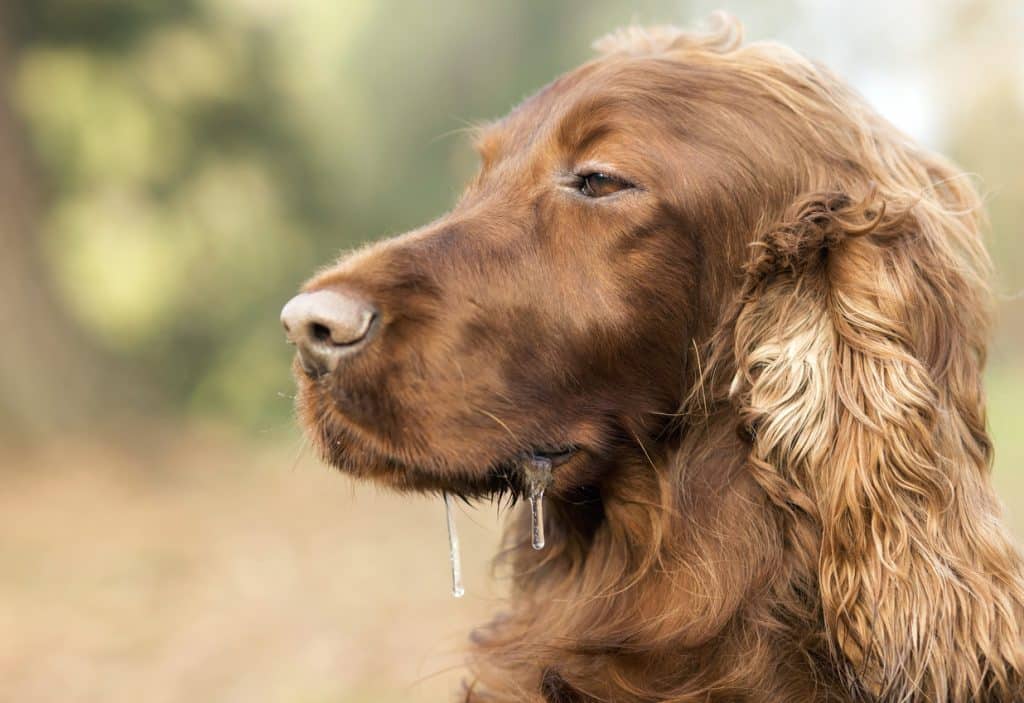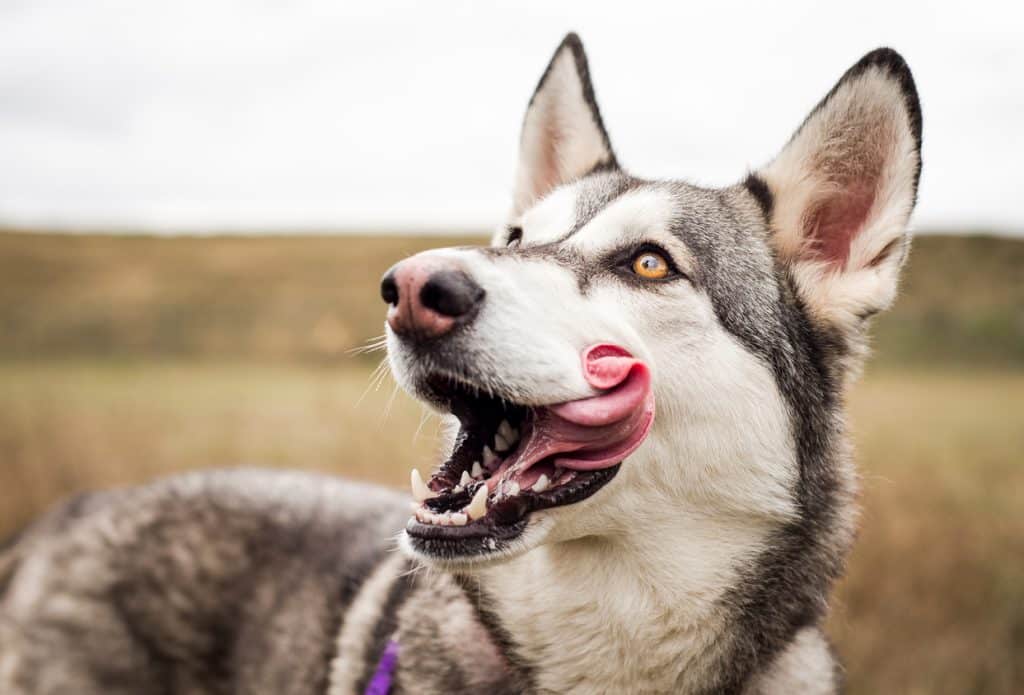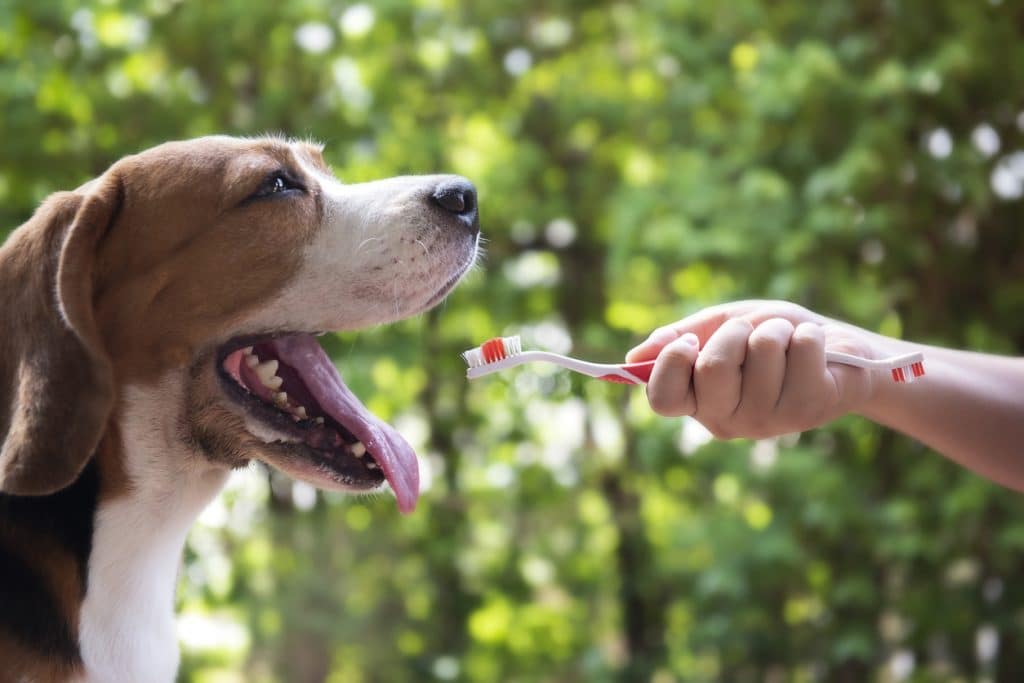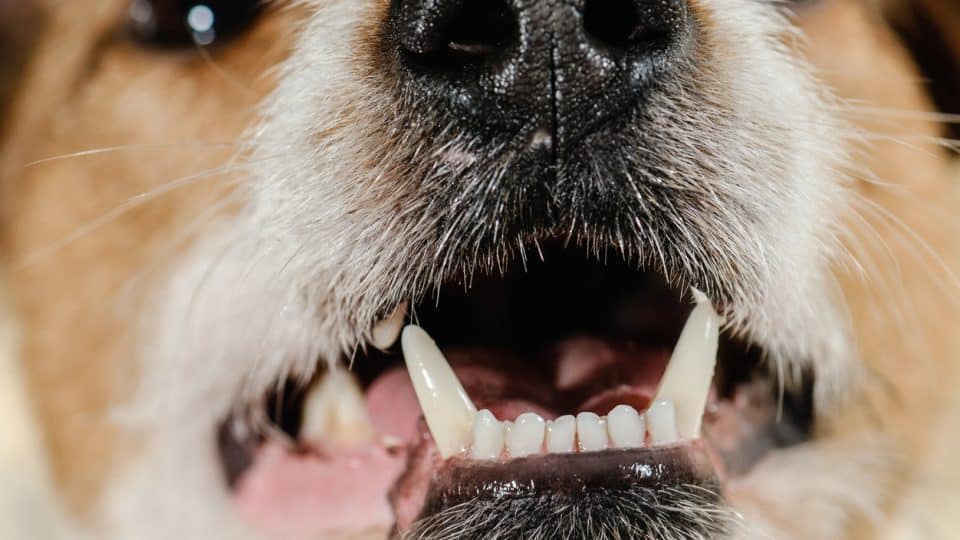The lack of drool pouring from your overly affectionate dog’s mouth may not immediately strike you as an issue. After all, it’s less slobber all over your clothes, furniture and carpets, right? But dog dry mouth, also known as Xerostomia can be a cause for real concern because dog saliva contains chemicals essential for your dog’s health. Dog saliva holds electrolytes, contains proteins and minerals that prevent dental cavities, lubricates the throat to aid in the digestive process. Dog saliva also contains antibacterial compounds that stop germs causing bad breath.
So while less slobber might seem good to you, it’s not so good for your dog. Dog dry mouth can also potentially indicate an underlying health issue. So it’s important to speak to your vet if you notice your dog is less drooly than usual. In this article, we’ve teamed up with our Medical Veterinary Advisor, Dr Rebecca Greenstein to bring you all the expert knowledge on this uncommon condition.
What Are The Symptoms Of Dry Mouth In Dogs?
Aside from a lack of slobber, there are other symptoms that can come along with dog dry mouth. These include:
- Bad breath: As mentioned above, dog saliva contains antibacterial compounds that fight the germs causing bad breath. So if your dog has dry mouth, they might also experience a bad case of halitosis as bacteria starts to build up.
- Thick saliva: When your dog’s got dry mouth, saliva can appear thicker since your dog isn’t producing enough liquid to thin it out. It can also be a side effect of medication—speak to your vet to find out.
- Cracked tongue: Dry mouth in dogs can make their tongue dry up and crack.
- Plaque accumulation: Saliva contains plaque-fighting bacteria, so a lack of it means plaque will start to build up.
- Mouth lesions: Without saliva to lubricate the mouth, lesions can appear as parts of the mouth rub together.
- Inflamed/bleeding gums: Poor oral hygiene which comes with lack of saliva can lead to other problems such as swollen and bleeding gums. If left unattended this can eventually lead to tooth loss.
- Receding gums: As tartar and plaque builds up in your dog’s mouth, it will push back the gum line and expose the sensitive part of the tooth.
- Food avoidance: With all these issues going on in their mouth, eating can be very painful for a dog with dry mouth. So it’s not uncommon that they’ll go off their food.
What Causes Dry Mouth In Dogs?
Dog dry mouth can be caused by a variety of factors. And some are more serious than others, which is why it’s always important to seek advice from your vet.
Some of the causes include:
Your dog is dehydrated
Okay, so this one’s simple! Does your dog love to run outside on hot days? Do they only eat dry kibble and rarely drink water? Then they might become dehydrated to the point that they stop producing so much saliva. Always make sure there’s plenty of fresh water available for them. Try introducing some wet food into your dog’s diet.
However, if your dog is severely dehydrated it’s important not to give them too much water all at once as this could induce vomiting. For severe dehydration following heat stroke, diarrhea or other illness, be sure to take your dog to the emergency vet where they may put them on an IV with rehydration fluids.
Your dog is having an adverse reaction to medications (including antihistamines)
If you’ve noticed that your dog has developed dry mouth since starting a course of medication, they might be allergic. Ironically, this can be particularly common for antihistamine medications. Take your pup back to the vet as soon as possible, especially if they are experiencing diarrhea and vomiting. Your vet may prescribe alternative medication or treatment that is more suitable for your dog.

Image credit: Wavetop | iStock
Your dog is undergoing radiation treatment for cancer
Cancer is always a difficult diagnosis for a pet parent to hear. Treatment for cancer can come with all sorts of unavoidable side effects as your pet is on their road to recovery. Dry mouth is just one of the symptoms your dog might experience if they are undergoing radiation treatment, along with hair loss, sore skin and general discomfort. The important thing is keeping your dog comfortable while they’re being treated, to lessen the impact of these side effects on your dog.
Keeping your pet comfortable can include pain medication, the right diet, correct hydration, a comfortable bed, and just the right amount of love and attention. Your vet will be happy to give you advice on this when you discuss their cancer treatment plan.
Your dog is having an abnormal immune reaction
A rare autoimmune condition called Sjogren Syndrome could be to blame, if your dog is showing a particular combination of symptoms. Dr Greenstein advises that if your dog not only has minimal saliva but also red, dry eyes and a history of limping or joint swelling, Sjogren Syndrome may be the unifying link. With this condition, a dog’s immune system misidentifies a threat, leading to the body attacking itself. Sadly, the cells responsible for saliva and tear production are targeted by this autoimmune attack, as well as the joints.

Image credit: Photography by Adri | iStock
Your dog has nerve damage
Salivary glands have a surprisingly complex nerve supply. Dr Greenstein explains that if a nerve is damaged by trauma, inflammation, autoimmune destruction, or tumors, some dogs will see a decrease in saliva production (usually on one specific side of their mouth). However, dogs have multiple sets of salivary glands. So if only one specific gland has been damaged, you might not see a noticeable reduction in saliva production.
A decrease in saliva production is unlikely to be the only symptom of nerve damage though. So if you notice other related symptoms in your dog—such as facial paralysis after an injury—be sure to take them to the vet to get them checked out. While facial paralysis might sound alarming, it won’t usually affect your dog’s quality of life, so try not to worry and follow your vet’s advice.
Other causes
Dry mouth can also accompany or be a symptom of a myriad of underlying health conditions. These can include: anxiety, hypertension, endocrine disorders, osteoarthritis, and others. It’s important to take your dog to the vet when you notice signs of dry mouth syndrome, as they’ll be able to figure out the root cause and recommend the best course of action.
How Is Dry Mouth Treated?
Assess the cause
The first thing a vet has to do to treat your dog’s dry mouth is to determine the cause. Dr Greenstein advises that there are various tests your vet can do for this. This of course begins with opening up your dog’s mouth to have a look! If a pup patient has thick, ropy, saliva, dry gums and tongue, stronger (bad!) breath, and disproportionately severe dental or periodontal disease but no other symptoms, your vet may suspect dry mouth based on clinical signs alone.
Next, your vet may run blood work to identify organ diseases or hormonal imbalances that can predispose excessive panting. More extensive testing would be likely if your vet suspects autoimmune disease or tumors in the head or neck.
Another less usual test is to place a drop of atropine on the tongue to assess salivary gland production. The famously bitter medication will induce significant salivation to the point of drooling in most healthy animals.

Image credit: FatCamera | iStock
Treat the underlying problem
Once your vet has determined the cause of the dry mouth, they’ll be able to advise you on the best course for treatment. According to Dr Greenstein however, it can be a struggle for vets to prescribe effective management options. Especially because animals can’t be trusted to use mouth rinses or mouthwashes without swallowing them! And sometimes the underlying problem itself might not be treatable. But there are still ways your vet will be able to help, and at the very least keep your dog more comfortable.
For example, a blended liquid slurry may be helpful for dogs who are suffering dry mouth post-radiation therapy, aiding swallowing and moisture. And certain pup patients may salivate more in response to oral prescription medications like pilocarpine.
Importantly: do not give your dog any human products without the explicit green light from your vet. For example, human oral rinses like Biotene contain a sweetener called xylitol which is fatally toxic in pets.
Other home treatments your vet may advise can include:
- Water additives
- Dog-friendly oral rinses
- Teeth brushing
- Moistened food
Takeaway—Prevention Can Be The Best Cure!
Generally, dry mouth in dogs is only temporary, and can be prevented with simple at-home care. Some ways you can prevent dry mouth include:
- Using a pet-specific mouthwash
- Purchasing water additives that help prevent dental disease
- Scheduling regular dental cleanings for your dog
- Brushing your dog’s teeth daily
- Giving your dog pilocarpine, especially before meals
- Choosing dog food with a higher water content

Image credit: undefined undefined | iStock
However, for dogs with chronic dry mouth or dry mouth from an undetermined cause, it’s important to work one-on-one with a vet to create a plan that can keep your dogs teeth, gums, and mouth healthy. According to Dr. Greenstein, it’s really important to speak to your vet if you notice your dog has dry mouth because saliva is very important for your dog’s overall health:
- Saliva doesn’t really seem like a critical bodily fluid. But it’s actually a key part of oral hygiene—helping to dilute, flush and kill bacteria in the mouth. It helps your dog to swallow their food effectively when they eat, and is part of the earliest stages of digestion.
- Without adequate saliva production, dogs can quickly develop some pretty significant bacterial overgrowth. Left unchecked, this can lead to severe tooth and gum infections and disease. (You can imagine how awful this can make their breath!)
- Your dog might also have difficulty with the basic act of eating, since swallowing becomes a bigger challenge.
So make sure to get in touch with your vet if you notice any of the signs we’ve outlined on this page.
Further Reading
If your dog is suffering with dry mouth, some of these articles might also be worth a read!


